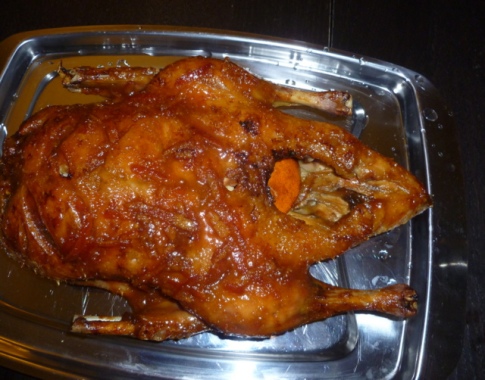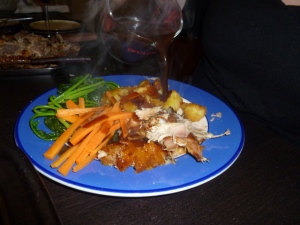This week, I am posting the series of posts that I failed to prepare properly before I went away on the permaculture course. I am going to document a roast duck, that fed the Big Guy and I for a week, over the course of this week. This will make me look like much more of a carnivore than I really am, because of the lamb I ate at Easter. But you can expect a number of salad and vegetable related posts to follow, I promise
As you know, I had some marmalade left that I couldn’t sell, and have been plotting its use. As well as the flapjacks, I have been ruminating on making a meat glaze.
I have seen marmalade based glazes for ham, and chicken wings, but neither of these really hits the spot for me. Also, I didn’t want to have to strain the orangey bits from the marmalade because, having taken the trouble to hand cut them and cook them, I didn’t see the point in wasting them. So, I thought about this some more. Suddenly, I remembered duck a l’orange, that classic dish so popular in the 70s – the decade where everything was brown and orange, from the wallpaper to the food. This had to be the way forward, after all, centuries of French cooks (and a decade of British dinner parties) can’t be wrong.
Duck always makes me think of asian flavours, like star anise and ginger. In many Northern European languages, the orange translates as the Chinese apple, so I knew that this fusion would also be welcome. So I ruminated some more, and finally decided upon this recipe.
I also have a number of meals with leftovers (that may, in turn create other meals in a some kind of recipe tumblr) that will follow this, so there was really no other choice than to use a whole duck. The leftover meals will feature a logical progression in coming posts.
So, we bought an organic, free range whole duck. Disappointingly, it was minus the giblets. I like the giblets, and they really contribute to a stock – indeed, you can get a twofer on stock if you have giblets, as you can make a quick stock with them, then have a slower cooked one with the bones later on. This would have made an amazing gravy. Why don’t they do this any more? If you are going to eat meat, I think that you should eat all of the animal, it shouldn’t have to die for the best cuts only. Plus, you know, duck liver on toast would have been nice.
The duck did come with a lot of quills under the skin. Since the skin was to hold the glaze, and considering how long I had been thinking about it, I wanted nothing to spoil my enjoyment of the crisp, glazed skin. So, the quills had to go. I turned myself cross-eyed trying to remove them all. There is probably a really easy technique to doing this, and if you know what it is, please let me know in the comments.
The disadvantage of the way I come up with recipes is that I often decide to make things without having attempted the techniques that underly them. It is the same with this recipe – I have never cooked a duck before. Not being one to be beaten by a little lack of technique, I turned to the internet. There I found the Hungry Mouse. She has a beautifully illustrated step by step guide to slow roasting a duck, with an alternative glaze. As soon as I saw it, I knew that this was the way I was going to cook my duck. Essentially, the slow roasting and turning will sort of confit the duck, which may have made an interesting take on rillettes, but not this time.
Anyway, this all worked out in the end, because by the time I’d finished cogitating, and had done my research, bought the bird, and plucked it properly, it turned out it was my birthday weekend, St Patrick’s day, and the last matched in the 6 Nations, so I decided to cook up a storm for the Big Guy and I before it all kicked off for the weekend. A friend also popped by, and she ended up staying for a three course dinner. And very welcome she was, too.
Recipe: Marmalade Glazed Duck
Ingredients
1 medium duck
½ orange, cut into quarters
Few sprigs of thyme
3 garlic cloves, left whole
For the Glaze:
3 tbsp marmalade (orange will also do, but I had clementine)
1 tbsp Cointreau
Juice of ½ an orange
1 tsp ground ginger
2 star anise
Small pinch dried chili flakes
For the Gravy:
Juices from the roasting tray – making sure you have removed as much of the fat as possible. Keep the fat in a jar, you will definitely need this later.
2 tbsp plain flour
Small glass of red wine
500 ml stock. Duck stock would be good, if you managed to snaffle some giblets. I used rabbit stock, which was surprisingly meaty.
Method
Cook the duck according to Hungry Mouse’s very-easy-to-follow directions and photos. The only thing I did differently was that I stuffed the bird with some aromatics (orange, thyme, garlic), which you shouldn’t pack in too tightly, it is important that air can circulate around the cavity. And I didn’t truss the legs up. The butcher (not my usual one) had “kindly” lopped off all the bits that don’t have a lot of meat on them, including everything below the bird’s drumstick, and the wing tips. Most people would appreciate this, but for me this was just even less to go in the stock pot. It also meant that there was nothing to truss or tuck up, so I didn’t.
The glaze is very easy to make, put all of the ingredients into a pan, and melt them on a low heat. Let them simmer for five minutes, then remove from the heat and allow the spices to steep in the liquid.
Once the bird has been cooking for four hours (and you have turned it, as per the directions), and you have removed the last of the fat, then glaze it with the spiced marmalade mixture. While you are doing this, turn your oven up to maximum and let it come up to temperature.
I used a pastry brush, and made sure I had glazed all of the skin, including the parsons nose. Keep brushing over the bird until there is no more glaze left.
Put the bird back into the oven, for 5-10 minutes, while the oven is high. I was also roasting some potatoes in some of the duck fat. To ensure that I was crisping the duck, not burning the potatoes, I put the potatoes on a low shelf and the duck on a higher one. When the duck was done, I turned the oven back down, put the potatoes on the top shelf and added a rhubarb and apple crumble, which we had with ice cream for dessert. Of course, this bit is optional.
Allow the bird to rest. It is really important to rest meat, it makes it a lot juicier, and relaxed meat is less likely to be tough. For steaks and cuts of meat, a good rule of thumb is to rest it in a warm place for half of the cooking time. Obviously, this doesn’t apply to a joint that you have cooked for four hours. Unless you want to eat the bird cold, in which case, go right ahead. Instead, I covered it with tin foil and a couple of tea towels then I set it aside for the time it took me to make a gravy, and for us to eat our starter (wild garlic salad with quails egg, and ramson pesto – which will feature in a salad post soon).
Make the gravy while the bird rests. First, heat up the stock in a pan.
Even removing as much of the fat as you can, you will still have enough to make the beginnings of a roux. Stir the flour into the fat and roasting pan juices. Put the roasting tin on the heat, and cook the flour out for a minute or two, stirring, so it doesn’t catch.This is so that your gravy doesn’t taste like raw flour later.
Deglaze the pan using the red wine. You will need the heat fairly high, and you will need to poke at all the stuck on meaty bits, so that they come away from the bottom of the dish.
If you want to be cheffy, or don’t want any lumps in your gravy, then strain the deglazed juices through a sieve. I usually just use a whisk to combine the fat and flour, so I don’t get huge lumps, and don’t bother to sieve it. Either way, add it to the stock, and continue to heat while you eat your starter, to allow the gravy to thicken
I served this with some braised kale, vichy carrots, and potatoes roasted in the duck fat. It was definitely a good match for the glaze, which made really crispy skin, even though the meat was falling off the bone. A really good start to a busy weekend.




Hi Mel — left over marmalade heh? Wot a problem! Well I still have some of your lovely cointreau/clementine marmaleade myself, and plan to use them tomorrow in making 1. A cheesecake (not the chocolate one that you and I talked about – I have another idea) and 2. Bara Brith for this Sunday’s ‘crafternoon’. Will report back. love, Jo
Wow, I look forward to seeing what you do with it. Understandably, you won’t be making this one, I guess. I made some hot cross buns that it went down beautifully with, so Bara Brith will be a winner. Sorry that I am missing out on that, but I am in the UK for a whistle stop tour of almost everywhere.
I’ll see you soon x
Hello! This is a bit of a panicked message in a bottle, but I’ve stumbled here via long, cross-eyed searching on google about the legendary 5 hour duck – may I just say your specimen looks fabulous. I know it’s been a while since you made it but I’m planning on cooking one for Christmas lunch and I’m in sore need of a bit of reassurance that it won’t end up dry as old boots. I’ve already murdered a rib roast this festive season, and I don’t think there’s enough emotional juice left in the tank to deal with a dud duck as well. I read all the comments on Hungry Mouse’s original page and being a sceptical bigot I’m wary of glowing American hyperbole, but a Brit who appreciates the wonders of wild blackberries and homemade marmalade is a source even I can trust. So please tell me: my little 2kg duckling isn’t going to die a leathery second death with 5 hours in a 140C oven? Do you think I should baste every 45 mins and check the internal temperature at about the 3 hour mark? Any guidance would be appreciated – you sound like a woman who knows her culinary onions. Merry Christmas!
Hi, firstly a very merry christmas. I hope I’m not too late with my reply, but I think your plan of basting regularly and checking at the three hour mark seems like the recipe for perfectly moist duck. And the best use for the rest of the fat is, of course, some delicious roast potatoes. Good luck, but I’m sure that with a plan like yours you’ll be fine!